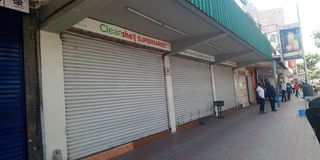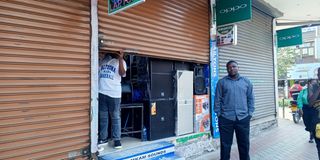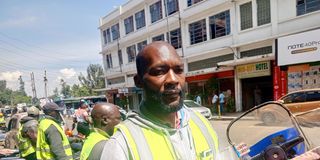Nakuru businesses count losses as nationwide protests enter third week

Cleanshelf supermarket remained closed for the better of the day as protests intensified on July 2, 2024.
On a typical day at 1:00 pm, the streets of Nakuru are usually busy with activity. Shops are open, and people are constantly moving, buying, and selling in various sections of the town.
However, this was not the case yesterday.
Some business owners who showed up for work stood in front of their shops, ready to flee if danger approached, while others opened their shop's roller shutter doors only halfway.
The tension was palpable as people moved about, anticipating the protests.
Vincent Nyabuti, who sells music equipment along Kenyatta Avenue, admits that his business has been affected by the protests.

Vincent Nyabuti outside his shop along Kenyatta Avenue on July 2, 2024.
"As you can see, most businesses here are either totally closed or halfway open at a time when we usually have the most sales," he says.
Nyabuti reveals that the past three weeks have been difficult, especially on Tuesdays and Thursdays.
"Most business people have resorted to closing shops to avoid vandalism by some rowdy protestors who take advantage of the demos and start robbing businesses," he explains.
He estimates that he has lost approximately one million shillings over the past three weeks due to the riots.
Nyabuti supports the protests, believing they are for a good cause to ensure the country has good governance, which will ultimately benefit businesses.
Luke Lekishon, whose business is on the first floor of Maombini Plaza, notes that the effects are noticeable.

Luke Lekishon during the interview on July 2, 2024.
"When there are protests, people cannot access businesses on the upper floors because the building is usually on total shutdown, and sometimes we are forced to close down just like our ground floor counterparts," he says.
Lekishon runs a PlayStation business, primarily serving Gen Z customers who are often involved in the protests.
"Most of the time, the shop is packed, but right now I have to close at 5 pm instead of the usual 9 pm," he notes.
Lekishon typically makes an average of Sh. 3,000 a day, but during protest days, he takes home only Sh. 1,000, a deficit of Sh. 2,000.
Edward Nyambane, a motorbike rider at the Gituamba House motorbike stage, is on standby, ready to veer off in case of any clashes between protestors and police.

Edward Nyambane a motorbike rider during an interview on July 2, 2024.
He notes that the number of customers has drastically fallen during protest days as most people tend to go home once the protests begin.
"I usually ferry more than 20 customers a day, but during protest days like today, I've only had five customers so far because businesses have closed and most people have gone home," he says.
Nyambane and other riders have resorted to food deliveries and using their savings to meet their basic needs.
The interview was interrupted by a group of protestors running away from the police, forcing us to find a safe place.
He closes off by noting that motorbike riders like him must be on standby to avoid getting hurt during the protests.
